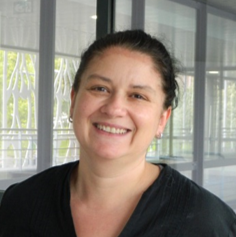
Professor assistant
Team 2MB2C
Office 140 CBRS
05 19 56 42 21
![]()
![]()
Research
We are studying the molecular mechanisms of cancerization of B lymphocytes with a particular focus on the transcription factors NF-kB and c-Myc which participate in the reprogramming of the B cell during the complex process of lymphomagenesis.
Activités de recherche
Diffuse large B cell lymphomas (DLBCL, Diffus large B-cell lymphomas ) are the most common aggressive lymphomas. Despite the effectiveness of current therapies, 15-20% of DLBCLs relapse or are refractory to treatment. This finding is very probably related to the great genetic and molecular heterogeneity of these lymphomas. Our overall objective is to define the role of the NF-kB and c-Myc transcription factors in this heterogeneity with a view to a better understanding of the transformation processes in order in fine to propose new targeted therapies.
Through in vitro and in vivo models, we have shown that the joint deregulations of NF-kB and c-Myc factors reprogram the B cell to increase proliferation, survival and energy metabolism, and decrease the anti-tumor immune response in particular linked to the expression of PD-L1 (David et al., Haematologica 2017). The mechanisms of regulation of the factor NF-kB are very complex as well as its mechanisms of action. NF-kB comes in 5 subunits which function by dimer: RelA (or p65), RelB, c-Rel, p50 and p52. We have identified transcriptional targets of RelA (or p65) and RelB in DLBCL infected with Epstein-Barr virus and demonstrated a mechanism of reciprocal inhibition (Chanut et al., Leukemia 2014). Our current project identifies c-Rel as the major NF-kB factor in DLBCLs from germinal center B lymphocytes.
Associated hospital staff
Nathalie Gachard (PH ; Service d’Hématologie biologique)
Arnaud Jaccard (PU-PH ; Service d’Hématologie clinique et thérapie cellulaire)
Mélanie Boulin (Technicienne ; Service d’Hématologie biologique)
Student supervision
Léa Prévaud (Doctorante)
National & international collaborations
Department « Gene Vectors » of « Helmholtz Research Center for Environmental Health » Munich (Director : Pr. W. Hammerschmidt), team « Infection and Immunity » Dr. U. Zimber-Strobl.
« Consortium NF-kB et Cancers » : V Baud (Inserm U 1016, Paris) ; K Leroy & C Copie-Bergman (INSERM U955, IMRB, Paris) ; F Jardin (INSERM U918, Centre Henri Becquerel, Rouen), J-P Jais (Service de Biostatistique, EA 4472, Hôpital Necker – Enfants Malades, Université Paris Descartes) ; et T Molina, Service Anatomopathologie CHU Hôtel Dieu, Paris, et Histopathology GELAPathologie platform (GelaP/GELARC, “Groupe d’Etude des Lymphomes de l’Adulte” – Pathological center)
Training
Teaching service carried out at the Faculty of Sciences and Techniques of Limoges in the Life Sciences department: 5 Bachelor courses (1) and 2 Masters courses in Biology and Health (2).
(1) BCP/ Biologie Cellulaire et Physiologie ; BBMCG/Biochimie, Biologie Moléculaire et Cellulaire, Génétique ; BGSTU/ Biologie Générale, Sciences de la Terre et de l’Univers ; BOP/ Biologie des Organismes et des Populations ; BCE/ Biologie et Chimie de l’Environnement.
(2) GB/ Génomique et Biotechnologie ; OMB/ Oncologie Moléculaire et Biothérapies.
Representative publications
David, A., Arnaud, N., Fradet, M., Lascaux, H., Ouk-Martin, C., Gachard, N., Zimber-Strobl, U., Feuillard, J., Faumont, N*. c-Myc dysregulation is a co-transforming event for nuclear factor-κB activated B cells. Haematologica 102, 883–894; 2017.
Troadec, E., Dobbelstein, S., Bertrand, P., Faumont, N., Trimoreau, F., Touati, M., Chauzeix, J., Petit, B., Bordessoule, D., Feuillard, J., Bastard, C., Gachard, N. A novel t(3;13)(q13;q12) translocation fusing FLT3 with GOLGB1: toward myeloid/lymphoid neoplasms with eosinophilia and rearrangement of FLT3? Leukemia 31, 514–517; 2017.
Chanut, A., Duguet, F., Marfak, A., David, A., Petit, B., Parrens, M., Durand-Panteix, S., Boulin-Deveza, M., Gachard, N., Youlyouz-Marfak, I., Bordessoule, D., Feuillard, J., Faumont, N*. RelA and RelB cross-talk and function in Epstein-Barr virus transformed B cells. Leukemia 28, 871–879; 2014.
Durand-Panteix, S., Farhat, M., Youlyouz-Marfak, I., Rouaud, P., Ouk-Martin, C., David, A., Faumont, N., Feuillard, J., Jayat-Vignoles, C. B7-H1, which represses EBV-immortalized B cell killing by autologous T and NK cells, is oppositely regulated by c-Myc and EBV latency III program at both mRNA and secretory lysosome levels. J. Immunol. 189, 181–190; 2012.
Faumont, N., Chanut, A., Benard, A., Cogne, N., Delsol, G., Feuillard, J., Meggetto, F. Comparative analysis of oncogenic properties and nuclear factor-kappaB activity of latent membrane protein 1 natural variants from Hodgkin’s lymphoma’s Reed-Sternberg cells and normal B-lymphocytes. Haematologica 94, 355–363; 2009.
Faumont, N., Durand-Panteix, S., Schlee, M., Grömminger, S., Schuhmacher, M., Hölzel, M., Laux, G., Mailhammer, R., Rosenwald, A., Staudt, L.M., Bornkamm, G.W., Feuillard, J. c-Myc and Rel/NF-kappaB are the two master transcriptional systems activated in the latency III program of Epstein-Barr virus-immortalized B cells. J. Virol. 83, 5014–5027; 2009.
Faumont, N., Le Clorennec, C., Teira, P., Goormachtigh, G., Coll, J., Canitrot, Y., Cazaux, C., Hoffmann, J.-S., Brousset, P., Delsol, G., Feuillard, J., Meggetto, F. Regulation of DNA polymerase beta by the LMP1 oncoprotein of EBV through the nuclear factor-kappaB pathway. Cancer Res. 69, 5177–5185; 2009.
Parcours
Depuis septembre 2010, Maîtresse de conférences à l’université de Limoges – En délégation pour le CNRS/ chaire CNRS de 2010 à 2015.
En 2010, chercheuse invitée à l’institut « Gene Vectors » du « Helmholtz Research Center for Environmental Health » à Munich (Directeur : Pr. W. Hammerschmidt), dans l’équipe « Infection and Immunity » du Dr. U. Zimber-Strobl.
Entre 2004- 2009, chercheuse post-doctorante à l’UMR-CNRS-6101 « Physiologie moléculaire de la réponse immune et des lymphoproliférations » (Directeur : Pr. M. Cogné), dans l’équipe « Mécanismes moléculaires de la lymphomagenèse » du Pr. J. Feuillard.
Entre 2000-2003, Doctorat de sciences de l’Université Paul-Sabatier (U.P.S) Toulouse III ; Spécialité Physiopathologie, Mention Immunologie ; au Centre de Physiopathologie Toulouse Purpan (C.P.T.P) INSERM U563 (Directeur : Pr. G. Delsol) ; sous la direction du Dr F. Meggetto-Pradelle (DR-CNRS) ; dans l’équipe « Lymphomagenèse et Génétique Moléculaire des Lymphomes » du Pr. G. Delsol.
